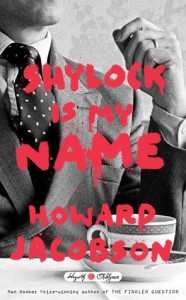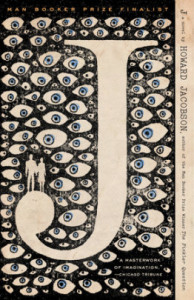
 Title: Shylock Is My Name by Howard Jacobson
Title: Shylock Is My Name by Howard Jacobson Series: Hogarth Shakespeare #2
Published by Hogarth
Published: February 9th 2016
Genres: Fiction, Retellings
Pages: 288
Format: Hardcover
Source: Blogging for Books
Buy: Bookshop(afflilate link)
Goodreads
Man Booker Prize-winner Howard Jacobson brings his singular brilliance to this modern re-imagining of one of Shakespeare’s most unforgettable characters: Shylock
Winter, a cemetery, Shylock. In this provocative and profound interpretation of “The Merchant of Venice,” Shylock is juxtaposed against his present-day counterpart in the character of art dealer and conflicted father Simon Strulovitch. With characteristic irony, Jacobson presents Shylock as a man of incisive wit and passion, concerned still with questions of identity, parenthood, anti-Semitism and revenge. While Strulovich struggles to reconcile himself to his daughter Beatrice's “betrayal” of her family and heritage – as she is carried away by the excitement of Manchester high society, and into the arms of a footballer notorious for giving a Nazi salute on the field – Shylock alternates grief for his beloved wife with rage against his own daughter's rejection of her Jewish upbringing. Culminating in a shocking twist on Shylock’s demand for the infamous pound of flesh, Jacobson’s insightful retelling examines contemporary, acutely relevant questions of Jewish identity while maintaining a poignant sympathy for its characters and a genuine spiritual kinship with its antecedent—a drama which Jacobson himself considers to be “the most troubling of Shakespeare’s plays for anyone, but, for an English novelist who happens to be Jewish, also the most challenging.”
A daughter doesn’t have to have an education to be taught how to hate her father. She can learn rebellion through an open window. It’s in the nature of a daughter.
Shylock Is My Name is Howard Jacobson’s addition to the Hogarth Shakespeare series, and I felt it to be such a let down after reading Jeanette Winterson’s The Gap of Time. I read Jacobson’s J last year and was disappointed in it in similar ways as I am disappointed in this one. While he can write, Jacobson is very disjointed in his writing, as if he is showing off to us plebs how smart, how intelligent, how verbose, how white, how upper class, and (in this case) how Jewish he is and therefore how much better he is than the rest of us. I can’t help but wonder if this is one of those books that are written for men, about men, and by men that us helpless females are too different fundamentally to understand what it’s all about.
In this case, this is Jacobson’s rendition of Shakespeare’s The Merchant of Venice. I have vague recollections of reading this play and finding Shylock interesting, but this novel didn’t seem to capture the Shakespeare “essence” as I felt Winterson’s retelling did.
What I disliked about this novel is the consistent and sexually charged current of a father obsessed with what enters his daughter’s vagina. Yes. Literally. I don’t recall that interpretation made of Shakespeare’s play, so it caught me off guard.
In chapter eight, Strulovitch comments on his daughter, Beatrice:
It had been going on a long time. She was thirteen when it started. Thirteen in fact, twenty-three in appearance. Luscious. A Levantine princess. A pomegranate. She was luscious to herself, too. He had caught her looking at her reflection in the mirror once, pouting her lips and laughing at her own fullness, smoothing her thighs, pushing out her breasts, amused by the too-muchness but overwhelmed by it at the same time. As though it imposed a responsibility on her. Was this really her? Was this really hers to do with as she chose? […] Of course she had to deploy herself. Of course she had to feel her beauty had a purpose beyond her own gaze and, yes – because she knew he tailed her, knew he followed her into her own bedroom even – beyond his.
It continues throughout the novel with Strulovitch thinking about whether or not he should find his daughter attractive. He also, through the entire length of the novel, considers the utmost importance of his existence was to make sure that the penis that enters her vagina is circumcised and importantly Jewish so that Beatrice is not banished from her family. Strulovitch is incredibly abusive in all ways to his young daughter in the way that many fanatic religious believers are. As her father, he believes he controls her entirely, from her day-to-day life to her private, sexual life. When she doesn’t listen to him, he goes off and throws a tantrum, demanding that pivotal pound of flesh.
In all, I think because I am not both “male” and Jewish, I miss the point of this self-reflexive novel. It brings to the forefront questions of Jewish morality in the modern age and whether or not the honest Jew should bend to the modern ways or be rigid as tradition dictates. And where The Merchant of Venice is argue as anti-semitic, I wonder if Jacobson’s novel is meant to be a mirror to it of sorts as it is constantly questioning the role of Jewishness in society where Merchant did not.
And where the play is unsympathetic toward Jewish people, this novel is unsympathetic toward women. It’s incredibly misogynistic in a way that’s uncomfortable and anger-inducing. Men do not own women and should absolutely never control the expression of a woman’s sexuality, no matter what age or relation. But alas. I don’t think Jacobson works for me, and I don’t think I’ll read anything of his in the future.
This book was provided to me for my honest review by Blogging for Books.

 Title:
Title: